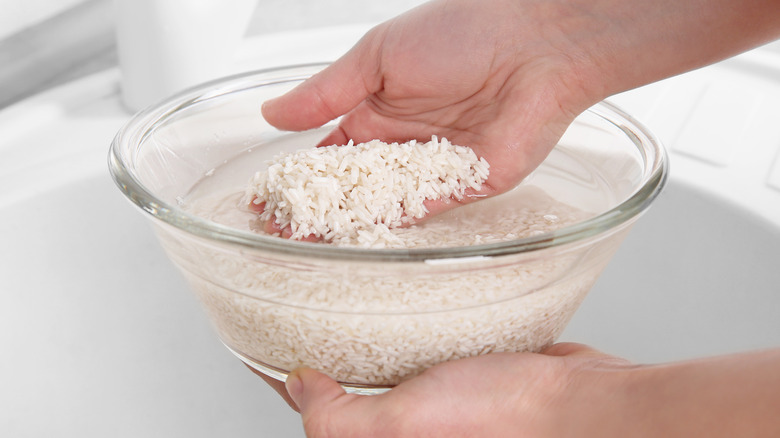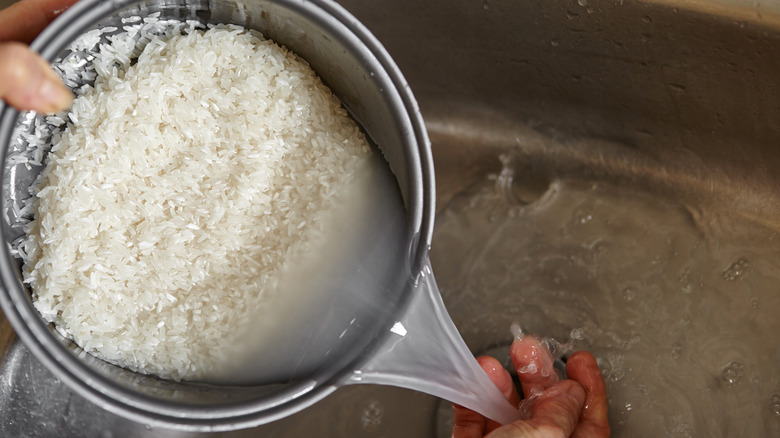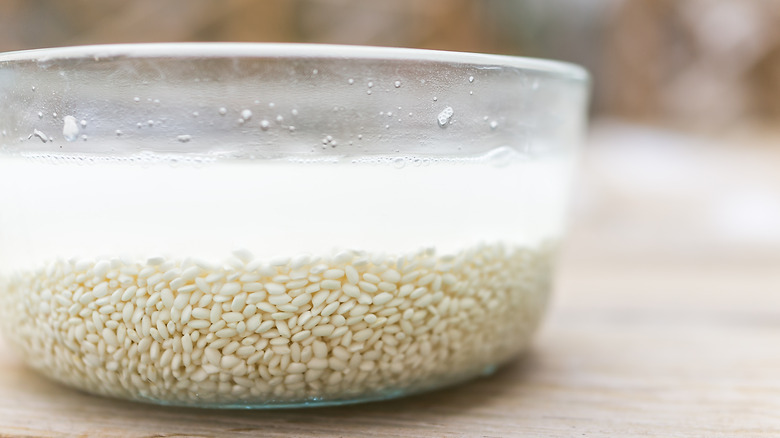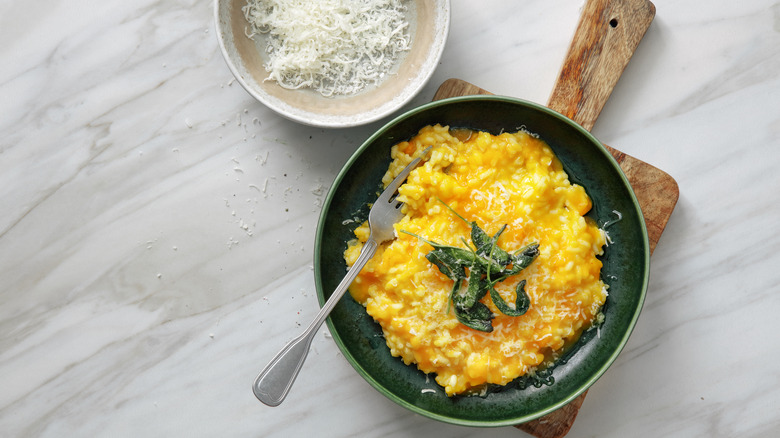Do You Really Need To Rinse Off Rice?
Rice is a staple food for over half of the world's population, which means that cooking it is a regular practice in most households. Everyone has their preferred method for how to make rice — the stovetop, the rice cooker, and even the Instant Pot can cook great rice. No matter what cooking method they choose, there's one instruction that most people adhere to: rinsing the rice before cooking it.
It's tempting to skip this step, because nobody wants to add extra prep time to making their meals, but don't let the few minutes of washing deter you. That's because if you don't do it, you run the risk of ending up with a pot full of gummy, clumpy rice, which means you've spent a bunch of time waiting around for a disappointing final result.
Skipping the rinse doesn't mean your rice is inedible, so there's no need to start over if you happen to forget to do it. However, unrinsed rice probably won't give you the fluffy, perfectly cooked grains you were hoping to enjoy. Saving two minutes for a ho-hum bowl of rice isn't going to do you any favors.
How to rinse your rice
Fortunately, rinsing rice is easy, and there are multiple ways to do it. One way is by placing your uncooked rice in a strainer and positioning it beneath your faucet in the sink. Run cool water over it and shake it around a little or stir it with your fingers until the water draining through the bottom comes out clear.
Another method, which is the one I use, begins with putting your rice in a bowl. Fill the bowl with plenty of cold water until it covers the grains, and swirl the rice around with your hands — you'll notice that the water will be a milky white color at this stage. After a vigorous round of stirring, drain the water from the rice (don't dump the rice in the sink by accident, which I've done before), and repeat the process.
After about three or four rounds of rinsing, you'll find that the water should be clear, and you're good to cook your rice. If you use a rice cooker like I do, rinse the rice in the rice cooker bowl and cook it straight from there.
I prefer the bowl method mainly because I can control the amount of water I use; when you run water continuously over rice using the strainer method, you inevitably waste some, but either way works perfectly well. The fact that you're rinsing the rice is more important than how you do it.
What rinsing rice actually does
Rinsing your rice off is a good idea for multiple reasons. First of all, it cleans the grain, which, just like anything else in this world, can be (and probably is, to some degree) dirty. The rinsing procedure will get rid of any extraneous materials, bugs, and dust that have no business being in your food to begin with.
Even more importantly, rinsing gets rid of excess starches on the grains. That's why your rice-rinsing water looks milky. This affects white rice in particular, since the protective layer of bran has been taken away, leaving the grains coated in starch. The starch is what causes your rice to stick together and become gummy once it's cooked. There are some instances where sticky, gloopy rice is the desired end result, but if you're looking for an end consistency with grains that aren't all bunched together, like a fluffy pilaf, rinsing is not an option but a necessity.
There are a few times when you won't want to rinse your rise
Just like with any rule, there are a few exceptions to rinsing your rice. One of them is that you don't need to rinse brown rice to prevent gumminess. I give it a brief spray to get rid of any potential dust and foreign materials, but otherwise, since the husk is intact on the exterior of each grain, you're not going to run into the external starch issue that causes white rice to stick to itself.
The other exception to rice rinsing is dish-specific. If you're making risotto, rice pudding, or other dishes where the excess starch helps create a creamy sauce, you'll actually want to preserve the starch by not rinsing the grains before cooking. The cooked starch thickens the sauce and gives it the velvety quality that makes both risotto and rice pudding feel luxurious.
So yes, under nearly any circumstance, you'll want to rinse rice before you cook it, save for a few specific purposes. Sure, it's a step in the cooking process that seems potentially minor, but there really is some sound culinary reasoning behind the practice.



